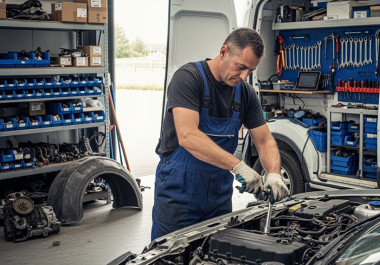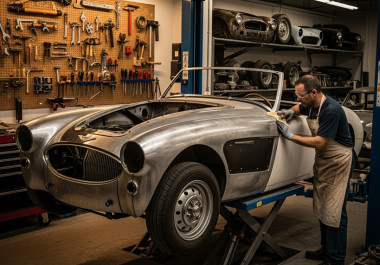In a world where electrical and computerised components have long played an ever-more crucial role in the construction and operation of modern vehicles, car diagnostic tools have become more or less indispensable companions for mechanics, from amateurs to professionals.
These tools have revolutionised the way mechanics identify and address issues, ensuring efficient and accurate solutions. And if you’ve ever bought a car from one of our online car auctions, and you’re planning to put it back on the roads, then it’s likely that one way or another these diagnostic tools will be vital in helping it get back in tip top condition. So, let’s take a look at why they’re so important.
A quick overview of car diagnostic tools
Let’s start with the basics. Car diagnostic tools encompass a wide array of devices designed to interface with a vehicle's onboard computer systems. These tools range from handheld scanners to advanced diagnostic machines found in professional car repair workshops.
Their primary function is to communicate with the vehicle's electronic control units (ECUs) to retrieve diagnostic trouble codes (DTCs) and provide real-time data on various parameters such as engine performance, emissions levels, and system functionality. All that makes them essential for mechanics to quickly diagnose issues and ensure vehicles are running efficiently.
Diagnostic tools come in various forms, each serving specific purposes in vehicle diagnostics. Basic handheld scanners are portable devices that plug into a vehicle's diagnostic port (usually located under the dashboard) and can read basic codes related to engine and emission systems. On the other end of the spectrum, advanced diagnostic machines offer comprehensive capabilities, including live data streaming, component testing, and software updates for multiple vehicle makes and models. These advanced features enable mechanics to perform detailed inspections and make precise adjustments, improving overall vehicle performance and reliability.
Why are they so indispensable for mechanics?
Obviously we’ve covered it in broad strokes above, but to get a little more specific, car diagnostic tools are indispensable for mechanics because they streamline the troubleshooting process and enable accurate problem identification. By accessing DTCs and live data streams, mechanics can pinpoint issues quickly without resorting to time-consuming manual inspections.
This efficiency not only reduces repair times, but also minimises guesswork, leading to cost savings for both the repair workshop and the vehicle owner. What’s more, diagnostic tools provide insights into potential issues before they escalate, allowing preventive maintenance measures to be implemented, which enhances customer satisfaction and loyalty.
Key features for effective diagnostics
Effective diagnostic tools share several key features that enhance their utility in automotive repair. First and foremost, compatibility across various vehicle makes and models ensures versatility and broad applicability. User-friendly interfaces and intuitive navigation are also crucial, allowing mechanics of all experience levels to operate the tools efficiently. Real-time data capabilities provide mechanics with instantaneous feedback on critical engine parameters, allowing for on-the-spot adjustments and performance optimisations.
And of course, advanced diagnostic tools often integrate with manufacturer databases to access technical service bulletins (TSBs) and software updates, ensuring that mechanics have the latest information and tools at their disposal. These features make diagnostic tools essential investments for professional mechanics.
Is it worth getting hold of diagnostic tools if I'm an amateur mechanic?
In short, yes. There’s a steep learning curve involved, but even for amateur mechanics, investing in diagnostic tools is always a smart move. These tools provide valuable insights into a vehicle's health, helping you to diagnose common issues like check engine lights or performance irregularities. That can give you the confidence to perform basic maintenance tasks more confidently and accurately, potentially saving money on garage visits. However, it's crucial to choose diagnostic tools that match your skill level and vehicle knowledge to avoid complications or misinterpretations of diagnostic data.
That’s all the important stuff covered! Now you know all the essentials about the diagnostic tools, then if you’re in the market for a salvage car that could use some attention from them – well, you’re in exactly the right place. Here at RAW2K, we update our online car auctions daily and weekly. We also include makes and models available from some of the world's leading manufacturers and, as we know now, firm public favourites like Volkswagen, Ford, Renault, and many more. Why not take a look at our online car auctions, and see what you can find?




